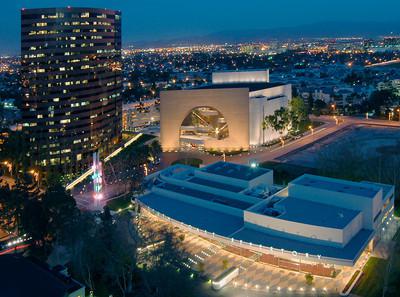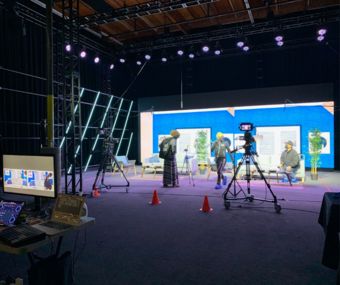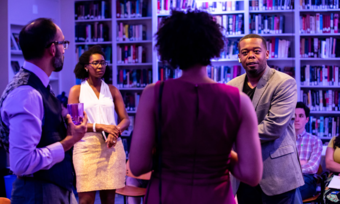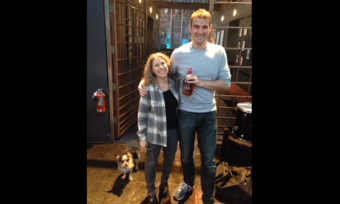Playwrights in the Community—Building Momentum at South Coast Repertory
There is a community and artistic engagement revolution happening at South Coast Repertory in Costa Mesa, California right now. And it’s being led by our playwrights.
José Cruz González. Julie Marie Myatt. Luis Alfaro. Marc Bamuthi Joseph. Carla Ching. Julia Cho. Aditi Brennan Kapil. Mona Mansour. Qui Nguyen. Tanya Saracho.
These ten writers are helping SCR to create bold, new community-based artistic programs and to reimagine our traditional models for making theatre—inspired by and for the many diverse communities of Orange County.
The (Real) Orange County
If you’ve never been to South Coast Repertory, we’re located in the heart of Orange County, forty-five minutes south of Los Angeles, depending on traffic—past Long Beach, Garden Grove, and Huntington Beach, famous for its sun-drenched beaches and professional surfers. Once an agrarian county, full of orange groves and lima bean fields, we’re perhaps now most famous for being the home of Disneyland. But contrary to the popular, national “mythology” of Orange County televised by The OC or The Real Housewives of Orange County, this is an incredibly diverse part of Southern California, culturally, socio-economically, and politically, not just a stereotypical bastion for the wealthy, social-elite, or Nixon-era conservatives.
Orange County is home to the largest Vietnamese population outside of Vietnam—and the second largest Muslim population in the United States, outside of Wayne County, Michigan.

Robert Hansen Photography.
This “mythology” of Orange County is justthat—a myth—and one that no longer accurately reflects the racially and culturally diverse 3,000,000-plus population living in the county’s thirty-four townships today. In 2010, almost one-third of people living within county limits were foreign born and 45 percent spoke a language other than English at home. There are large, active communities of Latina/o, Asian and Asian-American residents living throughout Orange County, including Mexican, Vietnamese, Korean and Chinese families in Santa Ana, Westminster, Garden Grove, Irvine, and elsewhere; and Middle Eastern-American and African-American residents in Irvine and Santa Ana, etc. Orange County is home to the largest Vietnamese population outside of Vietnam—and the second largest Muslim population in the United States, outside of Wayne County, Michigan.
Engaging the Community
Working closely with SCR’s staff in 2012, Artistic Director Marc Masterson articulated a new commitment to community-inspired work at SCR: “Our mission is to return our focus to the community in which we live,” he said. “To ask questions about our place in that community in new ways—and to engage artists to reflect back the stories of the people living and working around us.”
We strategized about finding partners for new programming that would connect our playwrights with our community. By early 2013, SCR had received funding from three crucial, forward-thinking organizations—the James Irvine Foundation, the Time Warner Foundation’s New Voices/New Visions program, and the Andrew W. Mellon Foundation. They were all looking to fund playwrights—the passionate, generative artists at the core of SCR’s commitment to new work—and place them as leaders at theatres dedicated to innovating and building new relationships and models of community and audience outreach.
SCR’s newest wave of community engagement was born—employing and empowering playwrights through two dynamic, two-year community-based initiatives: Dialogue/Diálogos and the CrossRoads Commissioning Project. (The Andrew W. Mellon Foundation funded playwright Julie Marie Myatt as SCR’s three-year Playwright-in Residence. More from Julie on HowlRound later this week.)
In the fall of 2012, thanks to funding from the James Irvine Foundation, SCR launched Dialogue/Diálogos, a two-year bilingual theatre project created to gather and tell the stories of the Santa Ana Latina/o community. Los Angeles playwright José Cruz González, a renowned writer, educator, and Cornerstone Theater associate artist, returned to SCR (where he directed the Hispanic Playwrights Project) to join Engagement Director Sara Guerrero (founding artistic director, Breath of Fire Latina Ensemble).
Together, they’re building an exciting new, large-scale community-based project—inspired by the engagement methodology of Cornerstone Theater Company, applied within a major regional theatre. Working with a stellar company of teaching artists and Associate Literary Director Kimberly Colburn, we’ve partnered with Latino Health Access, a Santa Ana nonprofit health organization focused on wellness and improving the lives of people within the community. Through a series of community story circles, artistic workshops, and readings over the past year, the artists and educators of Dialogue/Diálogos are developing a new, site-specific play inspired by the stories, challenges, hopes, and dreams of Santa Ana’s residents, which will be presented in their community this September. (More on Dialogue/ Diálogos to come from Sara Guerrero later this week, in a HowlRound blog post.)
The community engagement continued in 2013, when we learned that the Time Warner Foundation had generously funded SCR’s CrossRoads Commissioning Project, a new community-based initiative within the theatre’s renowned new work program. As part of the CrossRoads initiative, we commissioned eight playwrights, locally and nationally, to write new plays inspired by the incredible cultural and artistic diversity of Orange County.
This dynamic new program is actively creating new connections and dialogue between playwrights and our community by literally placing the writers inside our communities through immersive residencies. We’ve commissioned some of the most talented writers working in the American Theatre today, including: Luis Alfaro (Los Angeles, CA); Carla Ching (Los Angeles, CA); Julia Cho (Los Angeles, CA); Marc Bamuthi Joseph (Oakland, CA); Aditi Brennan Kapil (Minneapolis, MN); Mona Mansour (New York, NY); Qui Nguyen (Brooklyn, NY), and Tanya Saracho (Chicago, IL).
SCR’s History of Education, Community Work, and Advocacy
These new initiatives are building upon the long, celebrated history of education, community and artistic outreach at South Coast Repertory, now celebrating its fiftieth anniversary season. This includes our Conservatory, founded forty years ago to provide year-round theatre classes to children and adults; our Neighborhood Conservatory, which sends teaching artists into the community to teach ten-week workshops to underprivileged children; and a longstanding ticket outreach initiative, providing free theatre tickets to children and students for both our Theater for Young Audiences series and for every show in our regular season.
SCR’s commitment to its artistic community also includes a vibrant commissioning program and a decades-long commitment to developing and showcasing the best new work by American playwrights through two new play festivals—the Hispanic Playwrights Project and the Pacific Playwrights Festival.
For nineteen years, the Hispanic Playwrights Project (HPP) showcased the best Latina/o writers in the country through workshops and readings of new plays by Luis Alfaro, Cusi Cram, Nilo Cruz, Quiara Alegría Hudes, Lisa Loomer, Eduardo Machado, Oliver Mayer, Cherríe Moraga, José Rivera, Octavio Solis, and Caridad Svich, among many others.
In 2005, HPP was folded into the greater auspices of SCR’s Pacific Playwrights Festival (PPF), our annual showcase for developing and advocating for the best new plays in the country. In its first sixteen years, PPF has presented more than one hundred new plays that have gone onto production on our stages and at theatres nationwide.
Playwrights in the Community
Since the summer of 2013, six of the CrossRoads playwrights have completed immersive, four-day residencies in Orange County, connecting with more than thirty-four community groups across fifteen cities—creating new relationships with local community leaders, organizations, and artists.
We invited and challenged our CrossRoads playwrights to make their residencies about exploration, community connection, and creativity. Following a series of conversations about their artistic priorities and interests, we put them directly in touch with a wide cross section of cultural, community, and historical resources—and then let their inner artists run wild.
As the residencies geared up, Literary Associate Andy Knight provided each writer with a packet of research about the history and geography of “the OC,” alongside tailored research geared towards their areas of interest. We connected each playwright to a “community liaison”—engaging interested artistic staff members to help amplify the writers’ personal connections within Orange County—to give them a head start and another artistic friend within the theatre.
The playwrights’ residencies have been as interesting and varied as the writers themselves, ranging from meals and meetings with OC residents, schools, and community groups to exploratory artistic trips to the Pacific Symphony, The Pageant of the Masters, the US Open of Surfing, and the Orange County Fair (to see The Flaming Lips). Determined to give back to the communities they were engaging, many playwrights hosted free theatrical workshops, including Qui Nguyen’s “Engaging the Martial Mind: A Stage Movement and Storytelling Workshop” and Mona Mansour’s “Have Fun, Get Out of Your Own Way, and Write—In That Order: An Improvisation and Writing Workshop.”
“It’s a fascinating and forward-thinking concept,” says Minneapolis-based playwright Aditi Brennan Kapil, who explored the Southeast Asian, Bulgarian and punk rock communities during her OC residency. “Instead of talking about bringing diverse communities to your theatre, purposely immersing your theatre and your artists in those communities, and allowing for the possibility of art to happen as a result. We create from what we know, and the more we know, the more our humanity is expanded. I'm deeply grateful to everyone at South Coast for the time, the conversations, the coastal drives, the connections, for the opportunity to expand my humanity and let in new inspirations, and for the way the oddest moments have begun to weave their way into a play.”
Poet/playwright/performer Marc Bamuthi Joseph divided his residency into two trips; bringing his family with him last July to explore the Laguna Beach art and music scene by attending the Pageant of the Masters and the Pacific Symphony in Irvine. He returned in the fall to meet with community leaders and explore OCSA, the Orange County School of the Arts, through meetings with their Symphony Director, by attending class with their symphony students, and giving a poetry workshop to students.
Los Angeles playwright Carla Ching was interested in meeting with Asian-American community leaders and activists throughout Orange County. Her exploration included tours of UC-Irvine, the US Open of Surfing, and attending Common Ground’s Asian-American youth open mic night at the Vietnamese American Arts and Letters Association (VAALA) in Santa Ana. Ching also met with leaders from the Orange County chapter of APEX (the Asian Professional Exchange) and had dinner with community activist Alan Woo and his family to talk about the intersection of the Asian and Latina/o communities in the OC.
In October, Ching invited community leaders from three of the summer’s CrossRoads residencies to attend SCR’s world premiere of her new play Fast Company, a dark comedy about a family of Chinese-American con artists. We hosted a pre-show reception and conversation about her work, deepening the artistic conversation and connecting community leaders from UC-Irvine, VAALA, Common Ground, Project MotiVATe, The Orange County Asian and Pacific Islander Community Alliance, Inc. (OCAPICA), and other organizations.
With most of the residencies finished, we’re continuing the important conversations begun in the community at the theatre. Building on the momentum of the artistic residencies, Literary Associate Andy Knight and I have invited an engaged group of community leaders and connectors to join us for special “CrossRoads Convening” events, attending pre-show events and performances for every show in the 2014–15 season, deepening the conversation about SCR’s work and artistic process.
The CrossRoads writers will return this summer to develop and share their new work with our community in readings and workshops.
Residency 101 (or, What We Learned)
I believe that any theatre, regardless of size or budget, can create a low-cost community residency that puts its artists in direct contact with their community. It only requires a dedicated staff member (or two), time, and an earnest desire to stay connected through sharing your work and supporting one another, reciprocally.
In fact, 98.5 percent of all of our CrossRoads funding has gone directly to our playwrights, as we believe it should.
When we first started planning our CrossRoads residencies last summer, I was worried. I wasn’t sure how to construct the “perfect” four-day, immersive experience that would provide a truly meaningful connection to SCR and to Orange County. But I quickly realized that none of the residencies would be perfect—they would be a beginning, an introduction to our work and community—a place to start and a point of inspiration.
One of the most profound lessons I learned from our summer of residencies is how much you can do with relatively little time and money. In fact, 98.5 percent of all of our CrossRoads funding has gone directly to our playwrights, as we believe it should. In the first year, the funding paid for commission fees, residency travel, housing, and daily travel per diem. In the second year, it will fund continued research and writing time, along with developmental readings and workshops for the plays in progress.
There’s nothing new about the idea of building artistic residencies, but I think it’s inspirational and galvanizing to learn how other artists and theatres are structuring theirs. In that spirit, I want to conclude by sharing some of the simple lessons we learned while creating our CrossRoads residencies:
Let conversations with your artists inform everything. We started with questions. What do you already know about our community—and what are you most excited to learn (history, geography, art, culture)? Who would you most like to meet among our community leaders, organizations, and artists? How much downtime do you want to build in for writing, reflection, or free-range exploration? And what will bring you the most joy and fun while you’re here?
Spread your community net wide. Don’t worry too much about finding the “perfect” community partners for your artists. Start by reaching out to a wide cross-section of community groups, leaders, academics, and artists to see who’s most excited about connecting and opting in. Stay open to meeting new people and groups as you continue to work; serendipity is important.
Break bread together. When setting up community meetings, always try to include coffee or a meal. Breaking bread together is universal, even familial—and it really helped us to deepen the level of our early connections and conversations. (We also hosted SCR staff coffees with playwrights to amplify connections.)
Stay connected—and reciprocate. Build an email list—or Facebook page—with every community member, organization, and interested person you meet, so you can stay connected and invite them to join you for future shows and events. And do everything you can to support your community partners by donating tickets, giving free artistic workshops, and showing up to support their programming and special events.
Start small, but think big. Keep your initial community requests simple—ask for a meeting—but also provide context for building a long-term relationship. At SCR, we laid out an invitation for the next year: meet with our playwrights, come see our productions during the regular season, then join the writers next summer to hear the new plays you helped to inspire.











Comments
The article is just the start of the conversation—we want to know what you think about this subject, too! HowlRound is a space for knowledge-sharing, and we welcome spirited, thoughtful, and on-topic dialogue. Find our full comments policy here
Excellent!
Thanks so much, Winter! Your work and advocacy inspires me, always.
Congratulations Kelly, Marc and SCR, for putting your playwrights (and your money) where your audiences are and will be in the future.. Your investment in these artists and your community is admirable, and your methodology well conceived, imaginatively executed and obviously effective. Thanks for sharing so that others can replicate your projects and successes.
Thank you so much, Nan! We're thrilled about this work and excited to continue learning from others in the field who are working within their communities.
This project is amazing. So great to see so many artists I am familiar with working with you all in the OC. Thanks for your commitment to community and diversity.
Question, has your plans of community outreach began inside your institution? Is your staff reflective of the communities you outlined above?
Thanks so much, Erin! We're exceptionally proud of the artists working with us. The plans for community outreach definitely began inside our institution. Born of conversations with Marc, Paula Tomei (our Managing Director), Jose Cruz Gonzalez, Sara Guerreo, our myriad playwrights, etc. Our staff is diverse, in both its culture and gender. As our Literary Director, I'm also really proud of our overall commissioning pipeline, which includes more than 50% female playwrights and more than 40% Asian-American, African-American, Latina/o, and Middle-Eastern American playwrights. Artists reflective of our community and world, at large.
Cool beans!!
Thanks so much, Erin! We have a few pages dedicated to CrossRoads and Dialogos on our website. Will fold this into the ongoing conversation, as well.
A thought- your website should reflect the feel of this article as well and this previous statement- just a thought